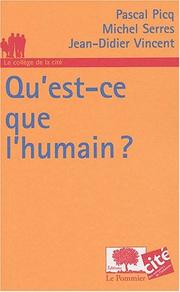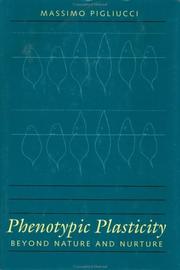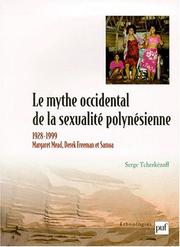| Listing 1 - 10 of 20 | << page >> |
Sort by
|
Book
Year: 1973 Publisher: Paris: PUF,
Abstract | Keywords | Export | Availability | Bookmark
 Loading...
Loading...Choose an application
- Reference Manager
- EndNote
- RefWorks (Direct export to RefWorks)
Book
ISBN: 2710103265 9782710103264 Year: 1982 Publisher: Paris: ESF,
Abstract | Keywords | Export | Availability | Bookmark
 Loading...
Loading...Choose an application
- Reference Manager
- EndNote
- RefWorks (Direct export to RefWorks)
Intellect --- Intellect --- Nature and nurture
Book
ISBN: 2891331095 9782891331098 Year: 1990 Publisher: Longueuil (Québec): Ed. du Préambule,
Abstract | Keywords | Export | Availability | Bookmark
 Loading...
Loading...Choose an application
- Reference Manager
- EndNote
- RefWorks (Direct export to RefWorks)

ISBN: 2746501309 9782746501300 Year: 2003 Publisher: Paris: Le pommier,
Abstract | Keywords | Export | Availability | Bookmark
 Loading...
Loading...Choose an application
- Reference Manager
- EndNote
- RefWorks (Direct export to RefWorks)
Trois chercheurs, un paléo-anthropologue, un neurobiologiste et un philosophe, définissent l'être humain. L'homme est à la fois resitué à l'intérieur du monde vivant (et perd ainsi son statut "d'animal doué de raison", et défini comme un "vivant parti à la conquête du temps."
Philosophical anthropology. --- Nature and nurture. --- Anthropologie philosophique --- Hérédité et milieu --- Hérédité et milieu
Book
ISBN: 2850080160 9782850080166 Year: 1981 Publisher: Lyon: Chronique sociale,
Abstract | Keywords | Export | Availability | Bookmark
 Loading...
Loading...Choose an application
- Reference Manager
- EndNote
- RefWorks (Direct export to RefWorks)
Caractère acquis --- Hérédité --- Égalite (Sociologie) --- Sociobiologie --- Sociobiology --- Nature and nurture --- Equality
Book
ISBN: 2367510040 9782367510040 Year: 2013 Publisher: [Paris]: Éditions Dehors,
Abstract | Keywords | Export | Availability | Bookmark
 Loading...
Loading...Choose an application
- Reference Manager
- EndNote
- RefWorks (Direct export to RefWorks)
Chasseurs-cueilleurs --- Sociobiologie --- Hérédité et milieu --- Hunting and gathering societies --- Sociobiology --- Nature and nurture
Book
ISBN: 2859840060 9782859840068 Year: 1977 Volume: 2 Publisher: Paris : Copernic,
Abstract | Keywords | Export | Availability | Bookmark
 Loading...
Loading...Choose an application
- Reference Manager
- EndNote
- RefWorks (Direct export to RefWorks)
Social stratification --- Developmental psychology --- Hérédité et milieu --- Intelligence --- Personnalité --- Psychologie différentielle --- Difference (Psychology) --- Nature and nurture --- Intellect --- Personality --- Genetics. --- Equality. --- Classes sociales --- Egalite et inegalite sociales

ISBN: 0801867886 9780801867880 Year: 2001 Publisher: Baltimore Johns Hopkins University Press
Abstract | Keywords | Export | Availability | Bookmark
 Loading...
Loading...Choose an application
- Reference Manager
- EndNote
- RefWorks (Direct export to RefWorks)
For more than two decades the concept of phenotypic plasticity has allowed researchers to go beyond the nature-nurture dichotomy to gain deeper insights into how organisms are shaped by the interaction of genetic and ecological factors. 'Phenotypic Plasticity: Beyond Nature and Nurture' is the first work to synthesize the burgeoning area of plasticity studies, providing a conceptual overview as well as a technical treatment of its major components. Phenotypic plasticity integrates the insights of ecological genetics, developmental biology, and evolutionary theory. Plasticity research asks foundational questions about how living organisms are capable of variation in their genetic makeup and in their responses to environmental factors. For instance, how do novel adaptive phenotypes originate? How do organisms detect and respond to stressful environments? What is the balance between genetic or natural constraints (such as gravity) and natural selection? The author begins by defining phenotypic plasticity and detailing its history, including important experiments and methods of statistical and graphical analysis. He then provides extended examples of the molecular basis of plasticity, the plasticity of development, the ecology of plastic responses, and the role of costs and constraints in the evolution of plasticity. A brief epilogue looks at how plasticity studies shed light on the nature/nurture debate in the popular media. 'Phenotypic Plasticity: Beyond Nature and Nurture' thoroughly reviews more than two decades of research, and thus will be of interest to both students and professionals in evolutionary biology, ecology, and genetics.
General ecology and biosociology --- Genetics --- Phenotype. --- Genotype-environment interaction. --- Nature and nurture. --- Adaptation (Physiology) --- Phénotypes --- Interaction génotype-environnement --- Hérédité et milieu --- Adaptation (Physiologie) --- Phenotypic plasticity. --- Phénotypes --- Interaction génotype-environnement --- Hérédité et milieu --- Acqui 2006 --- Phenotypic plasticity

ISBN: 2130514081 9782130514084 Year: 2001 Publisher: Paris : PUF - Presses Universitaires de France,
Abstract | Keywords | Export | Availability | Bookmark
 Loading...
Loading...Choose an application
- Reference Manager
- EndNote
- RefWorks (Direct export to RefWorks)
La culture polynésienne valoriserait-elle la liberté sexuelle chez les adolescents ? En 1928, l'ethnologue américaine Margaret Mead a prétendu l'avoir observé aux îles Samoa. En fait, Mead a reproduit un mythe occidental ancien. L'ouvrage présenté ici révèle le mécanisme : comment le mythe a orienté la préparation puis le contenu du travail de Mead. En contrepoint, il fournit les résultats d'une enquête récente et novatrice sur les représentations culturelles de la sexualité à Samoa. L'ouvrage fait également la critique du débat " Mead-Freeman " qui agite aujourd'hui le monde anglophone. Pour l'Australien Derek Freeman, l'erreur de Mead serait d'avoir cru à l'existence de valeurs culturelles alors que la sexualité ne relève que de la nature. Au contraire, on verra ici, avec le sac samoan, qu'il y a bien une détermination culturelle de la sexualité. L'obsession du tout biologique a conduit à négliger le rôle du mythe occidental. Freeman a examiné aussi le rôle des " informateurs ". Mead aurait été " dupée " par les jeunes femmes samoanes, qui auraient inventé des récits de liberté sexuelle prémaritale. Or les notes de terrain de Mead révèlent qu'elle fut surtout influencée par le discours des hommes samoans, même si le texte publié faut silence sur ce point. Ce discours souligne la valeur de la quête sexuelle chez les jeunes hommes - ce qui n'a rien à voir avec une " liberté sexuelle " des deux sexes, mais Mead n'avait pas fait la différence. Il manquait à ce débat une analyse contrastée des représentations samoanes masculines et féminines de la sexualité.
Sex --- Sexualité --- Mead, Margaret, --- Freeman, Derek --- Samoa --- Ethnology --- Samoans --- Nature and nurture. --- Sexual behavior. --- Methodology. --- Sexualité --- Ethnology - Samoan Islands. --- Samoans - Sexual behavior. --- Ethnology - Methodology. --- Freeman, Derek. --- Freeman, Derek (1916-2001) --- Mead, Margaret (1901-1978) --- Polynésie --- Anthropologie
Book
ISBN: 0716707535 0716707543 9780716707530 Year: 1975 Publisher: San Francisco : W. H. Freeman,
Abstract | Keywords | Export | Availability | Bookmark
 Loading...
Loading...Choose an application
- Reference Manager
- EndNote
- RefWorks (Direct export to RefWorks)
Developmental psychology --- Affective and dynamic functions --- Intelligence levels --- Race --- Ethnic groups --- Nature and nurture --- Niveau intellectuel --- Groupes ethniques --- Hérédité et milieu --- #SBIB:39A6 --- #SBIB:39A4 --- 159.922.3 --- Etniciteit / Migratiebeleid en -problemen --- Toegepaste antropologie --- Erfelijkheid in de psychologie. Aanleg --- Race. --- Ethnic groups. --- Nature and nurture. --- 159.922.3 Erfelijkheid in de psychologie. Aanleg --- Hérédité et milieu --- Physical anthropology --- Environment --- Genetics and environment --- Heredity and environment --- Nature --- Nature versus nurture --- Nurture and nature --- Genetics --- Heredity --- Human beings --- Ethnic identities --- Ethnic nations (Ethnic groups) --- Groups, Ethnic --- Kindred groups (Ethnic groups) --- Nationalities (Ethnic groups) --- Peoples (Ethnic groups) --- Ethnology --- Nurture --- Effect of environment on --- Environment and genetics --- Environment and heredity
| Listing 1 - 10 of 20 | << page >> |
Sort by
|

 Search
Search Feedback
Feedback About
About Help
Help News
News